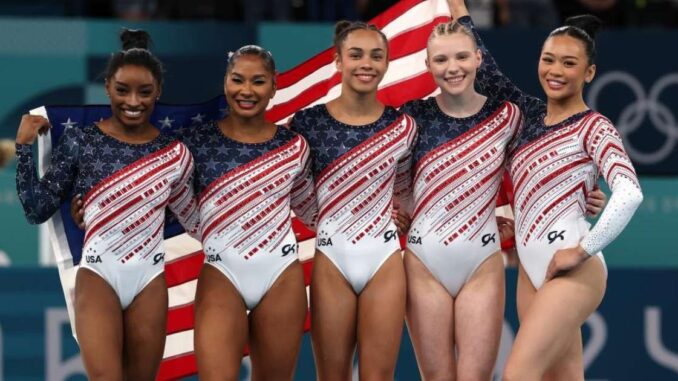
Biles’ decision in Tokyo 2020 to step back from several finals due to what she described as spatial disorientation—known in gymnastics as the “twisties”—and mental health challenges remains the key reference point for understanding her subsequent pauses. That experience forced her to rethink her relationship with competition and turned her into a global symbol of the mental health movement within elite sports.
Since the 2024 Olympics, Biles has appeared at public events and exhibitions rather than competitions. In multiple interviews, she has stated she is not ruling out Los Angeles 2028 but insists her well-being comes before any pressured timetable. That balance—between openness and restraint—defines her current stance: not a definitive “no,” but a clear pause from immediate expectations such as the 2025 Worlds.
Why Simone Biles’ Presence Still Matters
Simone Biles transcends gymnastics. She is not only a dominant champion but also a cultural icon of excellence, resilience, and technical evolution. Her participation—or lack thereof—at events like the World Championships or the Olympics carries wide-ranging effects for the sport’s competitive standards, public perception, and commercial ecosystem.
Sporting and technical innovation: Biles’ signature elements reshaped gymnastics’ scoring systems and set new standards of difficulty. Her presence raises the bar for judges and rivals alike. Her absence, conversely, removes the benchmark of excellence that has defined the past decade. Visibility and sponsorship: Biles draws audiences, sponsors, and global media attention. Her participation fuels investment and exposure for women’s gymnastics; her absence could mean reduced coverage and recalibrated commercial deals around major events.
Social and cultural influence: Whether she competes or not, Biles’ decisions carry symbolic weight. By returning, she would reinforce the idea that recovery and reintegration are possible after mental health struggles. By stepping back, she validates the legitimacy of self-care and athletes’ right to define their careers on personal rather than purely performance-driven terms.
What Biles’ Absence Means for the Sport
Biles’ decision not to compete in the 2025 Worlds has ripple effects across gymnastics, from her personal legacy to the institutional level. It forces governing bodies, coaches, and sponsors to rethink strategies and gives new generations a chance to step forward.
For USA Gymnastics: The federation must now accelerate its generational transition, reshaping rosters and media narratives without its biggest star. In the short term, it loses its anchor for team events and a major draw for global attention.
For international competition: The World Championships lose part of their competitive and commercial magnetism, while opening space for emerging gymnasts to seize the spotlight.
For her legacy and partnerships: A permanent retirement could reshape branding deals and future projects, though her cultural and historical stature would remain intact. Should she return in 2028, it would frame her story as one of comeback and resilience; if not, it would mark the graceful conclusion of an era that already changed the sport.
A Decision Beyond the Arena
Simone Biles’ absence from the 2025 World Championships is more than a sporting decision—it is a double-edged statement that combines self-preservation, media responsibility, and the recalibration of a legendary career. If she returns in 2028, her comeback will be one of the most anticipated sporting moments of the decade.
If she does not, gymnastics will lose its most transformative figure, yet the movement she helped spark—about mental health, athlete autonomy, and the redefinition of greatness—will endure as her ultimate legacy. Either way, Biles’ choices continue to redefine what it means to balance body, mind, and legacy at the highest level of sport.
The Day the World Stopped Watching for Gold
When Simone Biles—the most decorated gymnast in history—stepped away from the Tokyo 2020 Olympics mid-competition, the world was stunned. Fans expected gold medals, not headlines about mental health. But that moment, when she chose herself over the podium, changed not just gymnastics but the global conversation around mental wellness and pressure.
What truly happened to Simone Biles? What are the “twisties”? And how did this fearless athlete decide that mental health matters more than medals? Let’s dive in.
Who Is Simone Biles? The Unstoppable Force of Gymnastics
From Foster Care to Olympic Fame
Born in Columbus, Ohio, in 1997, Simone Biles had anything but an easy start. She spent part of her early life in foster care before being adopted by her grandparents, who gave her the foundation she needed to thrive.
Simone discovered gymnastics during a daycare field trip at age six—and it was love at first flip. From that day forward, the gym became her sanctuary.
Building a Legacy of Gold
By the time she was 19, Simone had already become a four-time Olympic gold medalist. Her routines redefined what was possible—gravity-defying twists, perfect landings, and unmatched poise. But with that success came something invisible: pressure. The kind that no one sees until it breaks you.
The Pressure Behind Perfection
The Weight of a Nation
Imagine performing for millions of people, knowing that one slip could end not just your career—but your country’s dreams. That was Simone Biles’ reality. Every move she made was dissected by judges, fans, and sponsors.
She wasn’t just an athlete—she was a brand, a role model, and a symbol of excellence. And that weight? It became too heavy to carry.
Social Media and the Spotlight
In the digital era, athletes aren’t just on the field—they’re online. Every performance sparks instant reactions, criticism, and comparison. For Simone, the endless attention amplified her stress.
Mental exhaustion, anxiety, and the overwhelming expectations finally caught up with her.
The Moment Everything Changed: Tokyo 2020
When Simone Said “No”
During the women’s team final at the Tokyo Olympics, Simone attempted a vault—and something went wrong. Mid-air, she lost all sense of direction. She didn’t know where the ground was. It wasn’t a physical injury—it was something mental, something terrifying.
Understanding the “Twisties”
The “twisties” are a gymnast’s nightmare. It’s a sudden mental block where the brain and body disconnect. You lose spatial awareness while twisting, which makes landing safely nearly impossible.
For most people, it’s hard to imagine. For a gymnast flying through the air, it’s life-threatening.
Simone realized continuing to compete would not only risk her career—but her life.
Mental Health in Sports: The Unspoken Battle
A Culture of Silence
For decades, athletes have been trained to “push through.” Injuries, pain, fatigue—it didn’t matter. Mental health was never part of the conversation. But Simone Biles broke that silence.
She stood before the world and said, “I have to focus on my mental health.” And in that moment, she gave permission for athletes everywhere to do the same.
Redefining Strength
Strength isn’t just physical. Sometimes, it’s walking away. Simone showed that protecting your peace doesn’t make you weak—it makes you wise. She became an icon not just for her flips, but for her honesty.
The Reaction: From Criticism to Celebration
The Backlash
Not everyone understood. Critics accused her of quitting, calling her “soft” or “unpatriotic.” But those voices missed the point—Simone wasn’t giving up. She was choosing survival over suffering.
The Wave of Support
However, the outpouring of support from fans, fellow athletes, and mental health advocates was overwhelming. Naomi Osaka, Michael Phelps, and many others praised her courage. She turned what could have been a scandal into a revolution.
The Science Behind the “Twisties”
It’s Not Just in the Mind
The twisties are neurological. They occur when your brain fails to map your body’s position in space. It’s a type of “mental misfire” caused by stress, fatigue, and anxiety.
For gymnasts who depend on muscle memory and spatial precision, this disconnect can be catastrophic.
Recovery Takes Time
Overcoming the twisties isn’t like healing a sprained ankle. It requires mental recalibration, rest, and retraining the body-brain connection. Simone had to rebuild trust in herself—and that takes courage few can understand.
Simone’s Return: A New Kind of Victory
From Survival to Triumph
In 2023, Simone Biles made her comeback at the U.S. Classic—and won. But this victory wasn’t about medals. It was about reclaiming her joy. Her smile said it all: she was competing for herself, not for approval.
A Symbol of Change
Today, Simone Biles represents more than gymnastics. She’s a symbol of self-awareness, resilience, and the power of saying “no” when the world says “go.”

The Bigger Picture: Mental Health in the Spotlight
Breaking the Stigma
Simone’s decision sparked global discussions about mental health. Workplaces, schools, and sports programs began re-evaluating how they treat emotional well-being.
She became proof that even the strongest can struggle—and that’s okay.
From Biles to a Movement
Simone’s courage encouraged others to speak up. Now, athletes from all disciplines openly discuss therapy, anxiety, and burnout. What was once taboo is now becoming part of athlete care.
Lessons We Can All Learn from Simone Biles
1. You Don’t Owe Anyone Your Peace
Your mental health is not negotiable. You don’t need to perform for others when you’re breaking inside.
2. Rest Is Revolutionary
Taking a step back doesn’t mean giving up—it means preparing for a stronger comeback.
3. Vulnerability Is Power
Admitting you’re not okay takes more strength than pretending you are.
The Legacy of Simone Biles
Simone Biles’ story will be told long after her routines fade from memory. She redefined success—not as perfection, but as authenticity. Her legacy isn’t just gold medals; it’s the golden lesson that self-care is the ultimate act of bravery.
Conclusion: The Hero Who Chose Herself
Simone Biles didn’t lose in Tokyo—she won something far greater. She showed the world that being human comes before being a hero. Her decision to step away was the greatest performance of all—not in gymnastics, but in life.
By choosing herself, Simone Biles taught us that strength isn’t measured in flips or medals—it’s measured in knowing when to stop spinning.